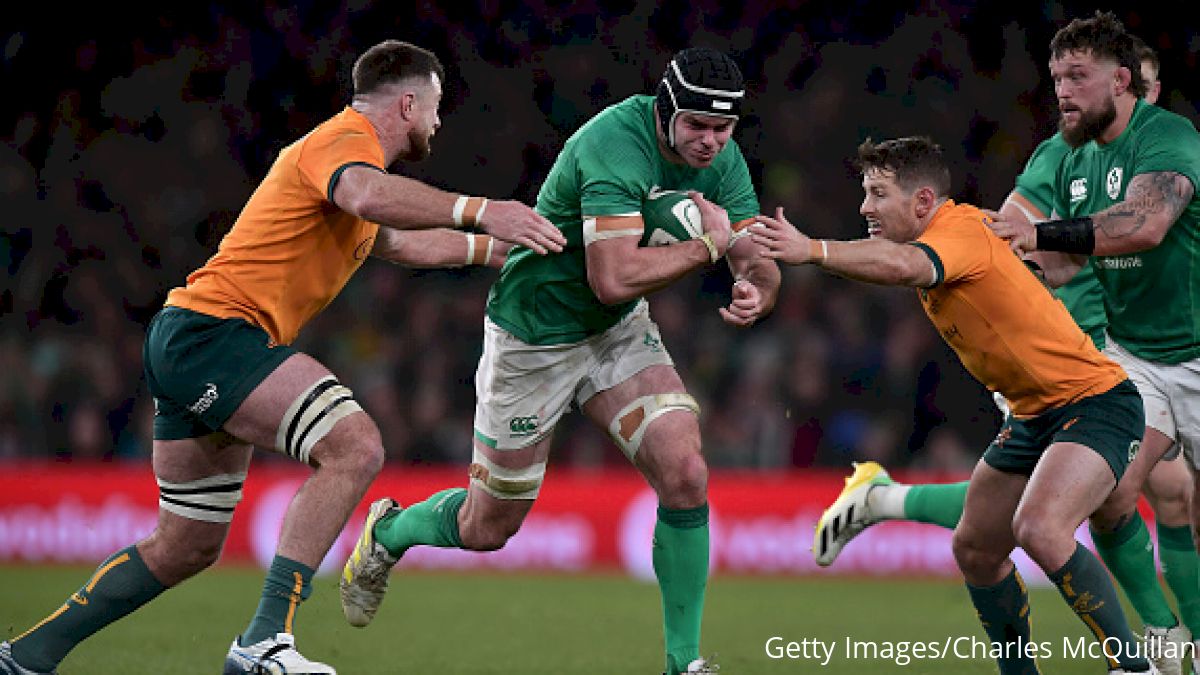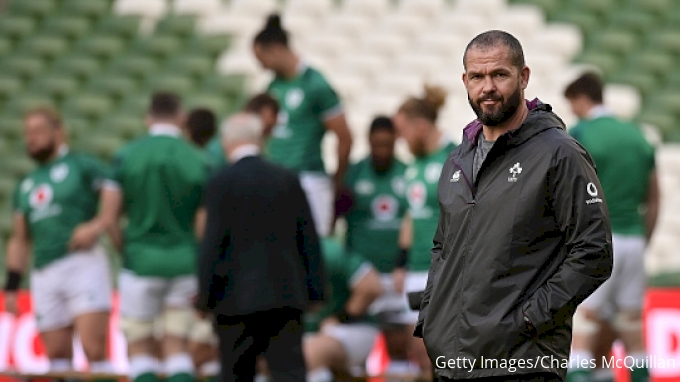Ireland's Big Lesson From 2019 Team Must Heed This Year
Ireland's Big Lesson From 2019 Team Must Heed This Year
No test-playing nation came into the World Cup year in 2019 with as much exuberance and hope as Ireland, which was understandably justified.

No test-playing nation came into the World Cup year in 2019 with as much exuberance and hope as Ireland, which was understandably justified.
They had just completed one of the more incredible test seasons in memory in 2018. It included a Grand Slam Six Nations title to start the year, a 2-1 series victory over the Wallabies in Australia in June and an undefeated November, which concluded with a famous win over the All Blacks at home.
Joe Schmidt was named World Rugby Coach of the Year.

Ireland was riding high with expectations and firming a successful World Cup campaign in Japan as the new year dawned. Ireland had surpassed England with two consecutive wins in the last two Six Nations and knocked off New Zealand, the two leading teams at that point in the cycle.
After reaching the peak of its powers, the World Cup couldn't come around soon enough. Ireland was ready to get past the quarterfinal stage, and more beckoned.
The opening game of the Six Nations in February saw England visit Dublin, where Ireland was the heavy favorite, having defeated the All Blacks at the same venue just four months earlier, while England had fallen off the rails in 2018.
Within 90 seconds, the air was sucked out of the Aviva Stadium, as Jonny May scored the opening try in clinical fashion. In those first few minutes, England looked sharp, powerful and overall too strong.
It was very early in the test, but the signs were ominous. Ireland had been punched in the face, and it was quite clear who was going to win the fight from that point.
That stunning 32-20 loss put Irish rugby in a state of flux, seemingly robbing the team of its mojo. Everything began to fall apart, and they harder they tried to recapture the magic, the more things went wrong.
Sexton was hauled over the coals for his visible frustrations with his own players against Italy. They won, but the 26-16 score was anything but impressive. It was clear they couldn't get their game clicking, and something was amiss.
The visit to Cardiff in the final round was the breaking point and where the wheels began to fall off. Wales scored within two minutes, its only try of the game, but suffocated Joe Schmidt's side into a 25-7 beating.
Confidence shattered, by the end of the Six Nations, Ireland had gone from clear favorite to third-best in Europe, some distance behind England and Wales, which was confirmed in the late summer.
In the summer warmups, Ireland suffered a humiliating 57-15 defeat at the hands of England on a sunny Twickenham afternoon. From peak optimism in January, despondency was rife in August.
By the time the World Cup rolled around, Ireland was a shell of the side that stormed through 2018. The squad suffered a shock defeat in pool play to host Japan and ended up drawing the All Blacks in a quarterfinal. The All Blacks tore Ireland to pieces.
The unraveling of Ireland in 2019 was bizarre, and there is no logical explanation for the dramatic fall from the outside. They had the players, the form heading into the year and momentum. Sexton, who received a World Player of the Year nomination in 2022, was a full three years younger than he is now.
Johnny x Josh! 🔥
— Irish Rugby (@IrishRugby) November 14, 2022
Two outstanding performers in green, Johnny Sexton and Josh van der Flier have been nominated for the World Rugby Men's Player of the Year award! #TeamOfUs | #IrishRugby pic.twitter.com/ybKwuiPnDT
It seemed to be all mental, combined with taking a 'waiting' approach.
As Ireland powered through its 2018 season, culminating in defeat of the All Blacks, expectations, hopes and dreams all climbed in exponential fashion, creating a new pressure to live with that proved fatal.
Once they got to the top, they didn't know what to do next, other than look too far ahead to the World Cup, the next obvious frontier, instead of the next task in front of them.
Schmidt admitted they changed the way they handled the Six Nations that year in order to 'be really good at the World Cup' but ended up bombing out at both tournaments.
The changed a successful system of preparation in order to test an unproven method, and once they dived into a funk, they could not get out of it.
In 2023, Ireland needs to forget about the World Cup. It will arrive in due time. It's not going anywhere.
The quarterfinal hurdle that holds such esteem in Irish rugby has become too sacrosanct. This pedestal has to be mentally abolished, so don't even bother talking about it.
This time around, Ireland is in a different position, which might help avoid the mistakes of 2019.
Despite climbing Everest with a series win over New Zealand in 2022 to highlight its credentials, France still is the front-runner in Europe and offers Ireland a reprieve from the pressure of leading the pack and any complacency associated with it.
Ireland might be the No. 1-ranked side, but the Irish have not conquered France in this World Cup cycle, losing in 2020, 2021 and 2022.
France offers a target to hunt, with added motivation. Ireland has not tasted success in the Six Nations since its last title in 2018 under Schmidt, which should have Andy Farrell's side hungrier than ever.

His message should be along the lines of 'don't waste the chance to win the Six Nations by expending even a second of thought on what will happen later in the year.' The two are completely unrelated outcomes, but they're equally important.
France is almost exactly where Ireland was in 2018, coming off a Grand Slam and a historic winning season. If any team is going to drop the ball this Six Nations, it is France, with one eye already on hosting the World Cup.
Midi Olympique, the French rugby newspaper, reported that the public is 'tired of waiting' to win the World Cup, after losing three finals in their history, desperate to play the tournament in peak form like Ireland in the last cycle.
They have already begun to sandbag, playing a reduced version of their game in November, and they weren't overly impressive. If France already is in waiting mode, they are in for a shock.
⏪ Last time out against Wales, we clinched a bonus point win to kick off the #GuinnessSixNations in style!
— Irish Rugby (@IrishRugby) January 10, 2023
Just four weeks until our 2023 Championship opener in Cardiff! 🏴#TeamOfUs | #IrishRugby pic.twitter.com/3pIPLuMiAW
Ireland has the chance to ambush them in Dublin in Round 2 and create the first crack in the dam. Then, the ball of string might unravel, as it did for Ireland four years ago. The World Cup is not won in February or March, but key momentum can be lost or gained.
Ireland should have full focus on Week 1 against Wales in Cardiff, and nothing else but regard for the Six Nations.